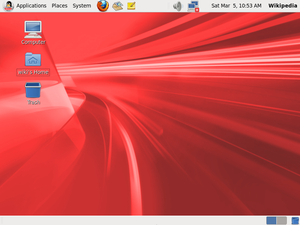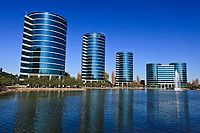- Oracle Linux
-
Oracle Linux 

Oracle Enterprise Linux Server 6Company / developer Oracle Corporation OS family Linux (Unix-like) Working state Active Source model Free and open source software Initial release October 26, 2006 Latest stable release 6.1 [1] / June 1, 2011 Marketing target commercial market, Server Available language(s) Multilingual Update method Yum (PackageKit)[2] Supported platforms x86, x86-64 Kernel type Monolithic (Linux) Default user interface Gnome License GPL Official website oracle.com/us/technologies/linux/index.html Oracle Linux, formerly known as Oracle Enterprise Linux, is a Red Hat Enterprise Linux-compatible distribution, repackaged and sold by Oracle, available under the GNU General Public License (GPL) since late 2006.[3]
Oracle Linux can be freely downloaded through Oracle's E-delivery service, and can be deployed and distributed without cost. [4] Commercial technical support is available through Oracle's Oracle Unbreakable Linux Support program, which supports Oracle Linux, and existing RHEL or CentOS installations (i.e. without reinstallation[5]).[3] As of 2011, Oracle Linux has over 8,000 customers subscribed to the support program.[6] [7]
Contents
RHEL compatibility
Oracle Corporation distributes Oracle Linux with two kernels:
- Red Hat Compatible Kernel - identical to the kernel shipped in Red Hat Enterprise Linux (RHEL).
- Unbreakable Enterprise Kernel - based on a later Linux 2.6-series kernel, with Oracle's own enhancements for OLTP, Infiniband, and SSD disk access, NUMA-optimizations, RDS, async I/O, OCFS, and networking.[8] [9]
Oracle claims that the Unbreakable Enterprise Kernel is compatible with RHEL, and Oracle middleware and 3rd-party RHEL-certified applications can be installed and run unchanged on Unbreakable Enterprise Kernel.[3]
Hardware compatibility
Oracle Linux is certified on servers from IBM,[10] HP, [11] Dell,[12] and Cisco.[13] In 2010, Force10 announced support for Oracle VM and Oracle Linux.[14] Oracle Linux is also available on Amazon EC2 as an Amazon Machine Image. [15]
Oracle/Sun servers and blades with x86-64 processors can be configured to ship with Oracle Linux.[16]
Virtualization support
Under the Unbreakable Linux program, Oracle supports KVM and Xen.[3]
Oracle products (including Oracle Database and other Oracle Applications) are only supported under the Xen-based Oracle VM.[17]
Oracle Linux deployment inside Oracle
Oracle Linux is used by Oracle internally to lower IT costs. Oracle Linux is deployed on more than 42,000 servers by Oracle Global IT; Oracle On Demand, Oracle University, and Oracle's technology demo systems also run Oracle Linux.[3]
Software developers at Oracle develop Oracle Database, Fusion Middleware, Oracle Grid Engine, E-Business Suite and other Oracle Applications on Oracle Linux.[3]
Oracle Linux is used as the underlying operating system for the following appliances. [18]
- Oracle Exadata
- Oracle Exalogic
- Oracle Big Data Appliance
- Oracle Exalytics
Oracle Linux specific addition
- Ksplice - Oracle acquired Ksplice Inc in 2011, and offers Oracle Linux users Ksplice to enable hot kernel patching[19]
- DTrace - Oracle ported DTrace from Solaris as a Linux kernel module[20]
Future SPARC version
In December 2010, Oracle CEO Larry Ellison announced that future versions of Oracle Linux will run on Oracle's SPARC and UltraSPARC T-series (Niagara) platforms.[21]
Release history
- Oracle Linux 6, 6.1 [22]
- Oracle Enterprise Linux 5, 5.1, 5.2, 5.3, 5.4, 5.5, 5.6, 5.7 [23]
- Oracle Unbreakable Linux 4.5, 4.6, 4.7, 4.8, 4.9 [24]
See also
- Oracle Solaris
- Red Hat Enterprise Linux derivatives
- Commercial products based on Red Hat Enterprise Linux
References
- ^ "Oracle Linux 6.1 has been released (Oracle's Linux Blog)". http://blogs.oracle.com/linux/entry/oracle_linux_6_1_has. Retrieved 6 June 2011.
- ^ Oracle Public Yum Server
- ^ a b c d e f "Oracle Linux FAQ". Oracle Corporation. http://www.oracle.com/us/technologies/027617.pdf. Retrieved 14 April 2011.
- ^ Fast, Modern, Reliable Linux at a Fraction of the Cost of Red Hat
- ^ Switching from Red Hat Network to Unbreakable Linux Network (ULN)
- ^ Oracle Buys Ksplice: Oracle Linux Enhanced with Zero Downtime Software Updates
- ^ Oracle previews RHEL-ish 2 Linux kernel
- ^ Oracle Linux with Oracle's Unbreakable Enterprise Kernel
- ^ Oracle Linux
- ^ IBM System x and BladeCenter solutions - Oracle Linux
- ^ Open Source and Linux from HP
- ^ Oracle Solutions
- ^ DC Partner - Oracle
- ^ Force10 Networks Announces Support for Oracle VM and Oracle Linux for its Virtualization Solutions
- ^ Amazon Machine Images (AMIs) > Oracle
- ^ Sun Servers
- ^ Oracle VM
- ^ PartnerCast: Oracle Linux on YouTube
- ^ Customer Letter | Oracle and Ksplice
- ^ trying out dtrace
- ^ Ellison: Oracle Enterprise Linux Coming to Sparc
- ^ Index of /el6/docs
- ^ Index of /el5/docs
- ^ Index of /el4/docs
External links
- Oracle Linux homepage
- Official Oracle Linux technical support forum page
- IBM System x and BladeCenter solutions - Oracle Linux
- Oracle Linux at DistroWatch
Oracle Corp. Corporate Directors Jeffrey Berg · H. Raymond Bingham · Michael Boskin · Safra A. Catz · Larry Ellison · Héctor García-Molina · Joseph Grundfest · Jeffrey O. Henley · Mark Hurd · Jack F. Kemp · Donald L. Lucas · Naomi O. Seligman
Acquisitions Sun · PeopleSoft · Hyperion · Siebel · BEA · JD Edwards · RightNow · Virtual Iron · Timesten · Retek · SunopsisDBMS Programming languages IDE Middleware Operating Systems Oracle Linux · Oracle SolarisHardware Computer appliances Annual Revenue: $26.82 billion USD 2010 · Employees: 105,000 · Website: www.oracle.com
 Category ·
Category ·  Commons
CommonsDerivatives of Red Hat Enterprise Linux or Fedora Red Hat Enterprise Linux derivatives Fedora derivatives Berry Linux · BLAG Linux and GNU · LinuxTLE · MythDora · Aurora SPARC Linux · Planet CCRMA · Red Flag LinuxLinux distributions Arch Linux · CentOS · Debian · Fedora · Gentoo · Knoppix · Linux Mint · Mandriva Linux · Red Hat Enterprise Linux · Slackware · SUSE · Ubuntu · more…Comparison • List Categories:- RPM-based Linux distributions
- Enterprise Linux distributions
- X86-64 Linux distributions
- Oracle software
Wikimedia Foundation. 2010.
